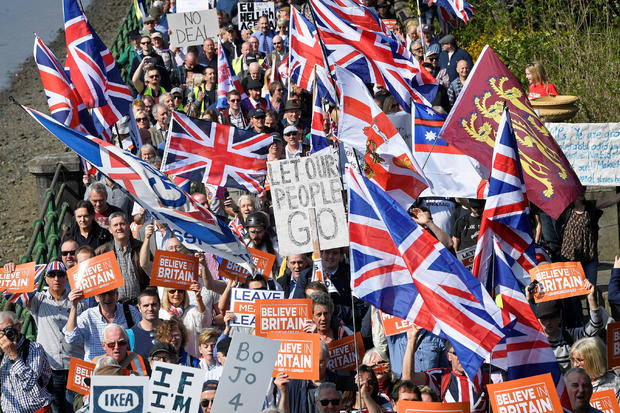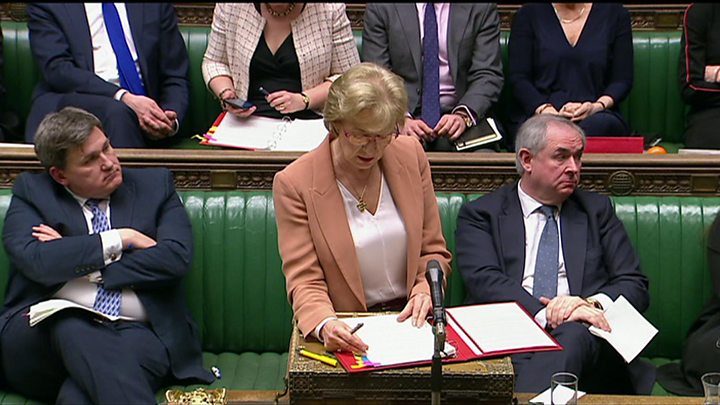London -- Friday was meant to be the day Britain formally ceased to be a member of the European Union. But three years after the public referendum calling for the divorce, the two sides appeared no closer to agreeing an amicable separation. Even Britain has yet to figure out what it wants.
British lawmakers have made it abundantly clear, however, what they don't want: the hard-won draft "Brexit" plan that Prime Minister Theresa May negotiated with the EU. On Friday afternoon, Parliament rejected -- for a third time -- May's withdrawal deal, or at least the most elemental part of it, the legal withdrawal agreement.
The vote leaves the U.K. closer to a possible "crash out" of the European Union on April 12 with no deal in place -- risking a dramatic impact on the British economy. Or Britain could seek a much longer delay to the process from the EU.
May's government stripped out all of the "political agreement" aspect of her draft deal to bring it to a vote on Friday because she has been forbidden by the legislature from bringing the exact same deal back for a third vote.
But it wasn't just that she needed to present an altered plan for a vote; she also knew that the devil was in the details.
So what's next?
Nobody really knows for sure. Lawmakers will gather again on Monday to hold another series of votes on a range of alternative plans to May's. But they tried that just days ago and not one of the eight options put forward gained majority backing from lawmakers.
As CBS News correspondent Mark Phillips reported from Parliament on Friday, there is no clear path to Brexit.
"I fear we are reaching the limits of this process in this house," May herself noted immediately after losing the vote, but she vowed to "continue to press the case for an orderly Brexit."
Calls were made quickly, however, for May to step down, and the prospect of a new general election was also rising.
There are still huge differences of opinion in London over key aspects of how any divorce should work, most notably how to keep goods and people flowing smoothly across the border between Northern Ireland (part of Britain) and Ireland (an independent nation and EU member). The small frontier is the only land border between the U.K. and the EU, and it has essentially been an invisible line for decades, since peace was restored after years of sectarian violence on the island; "The Troubles."
On Wednesday, May even offered to resign the premiership if lawmakers backed her deal, but the concession didn't work. She lost by 58 votes.
The Prime Minister may now seek another, longer extension to Britain's exit from the EU, but it isn't clear if May will be allowed to remain in power long enough to continue driving the process -- not that a new general election would bring any near-term certainty to the Brexit fiasco.
There were also mounting calls after Friday's vote for an outright revocation of the "Article 50" measure that the U.K. filed under EU law, officially putting the Brexit process in motion. Some Members of Parliament want Article 50 revoked to give the British legislature more time to find a consensus plan. Others want it revoked to simply stop the process, and possible not resume it.
What the EU says
EU leaders said right after the vote that it had made a "no-deal" Brexit even more likely, and they reissued their call for Britain's lawmakers to decide on and then tell the other 27 members states what they want.
"The risk of a no-deal Brexit is very real," Netherlands Prime Minister Mark Rutte told journalists right after the vote in London. "One of the two routes to an orderly Brexit seems now to be closed. This leaves only the other route, which is for the British to make clear what they want before April 12."
Poland's prime minister said before the vote that the European Union was open to further extending Britain's departure from the bloc. Premier Mateusz Morawiecki told reporters, after talks with EU Brexit negotiator Michel Barnier, that if May's bid in the House of Commons failed, the EU was "open to extending the departure process" on a motion from London, by "six or nine or 12 months, these options are available." But they only want to do that if it looks like such a delay will yield progress at breaking the deadlock in London.
In a statement released on Friday, the European Commission, said: "As per the European Council (Article 50) decision on 22 March, the period provided for in Article 50(3) is extended to 12 April. It will be for the UK to indicate the way forward before that date, for consideration by the European Council. A "no-deal" scenario on 12 April is now a likely scenario."
Many Brexit backers in Britain, including in May's own Conservative Party, would be loathe to see the process dragged out much longer, fearing it could lead to death-by-delay of the mandate given by the public in the 2016 referendum.
Retired charity worker Mandy Childs, one of a band of hard-core Brexit supporters who walked across England to London under the slogan "Leave Means Leave," said she felt "heartbroken."
"We were told over a 100 times by a British prime minister that we would be leaving on the 29th of March, 2019," she said.
"To do that, promise the British people that and then say 'Actually, no, we need to just put it back' - absolute betrayal. And how dare she?"
Opinion polls have shown that since the referendum, as the complexities of the divorce have become apparent and the "Vote Leave" campaign has come under mounting criticism for its tactics during the run-up to the public vote, the tide has likely turned, and a thin majority now appears to be against leaving the EU at all.
Indeed hundreds of people did join the "March to Leave" rally that trooped through central London on Friday, but the numbers were dwarfed by a huge demonstration in the British capital over the weekend, demanding a second public vote, with many rejecting any Brexit at all.
https://www.cbsnews.com/news/brexit-vote-today-theresa-may-european-union-withdrawal-live-updates-29-03-2019/
2019-03-29 15:07:00Z
52780249686109







